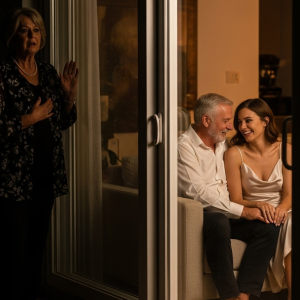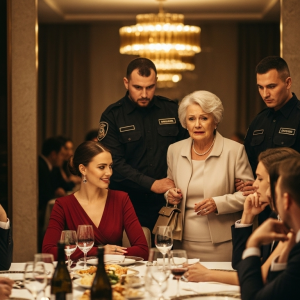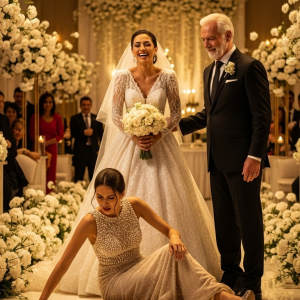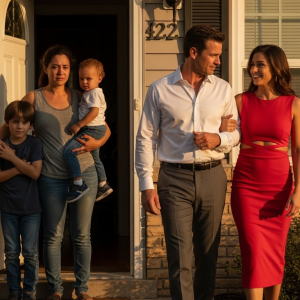My name is Alice Edwards, and I’ve always believed that family celebrations should be moments of joy. My granddaughter Jennifer’s wedding was supposed to be one of those days. Instead, it became the day I discovered how my family truly saw me.
The ceremony at St. Mark’s Church was lovely. Jennifer was radiant, and my son, Richard, beamed with pride as he escorted her down the aisle. For a few brief moments, everything felt right. It was at the reception where the facade cracked. I arrived at the grand ballroom of the Westbrook Hotel and made my way to the check-in table.
“Here you are, Mrs. Edwards,” the young woman said, handing me my name tag. I glanced down, expecting to see Alice Edwards, Grandmother of the Bride. Instead, in elegant calligraphy, were the words: The old lady who will pay for everything.
My hand froze. “There seems to be a mix-up,” I said, forcing a smile.
Her eyes widened. “Oh! I’m so sorry, let me check—”
“It’s fine,” I said quickly, not wanting to cause a scene. I pinned the offensive tag to my dress, my cheeks burning with humiliation, and walked into the ballroom.
I tried to enjoy myself, but then I overheard a conversation that made my blood run cold. “Did you see the grandmother’s name tag?” someone whispered with a snicker. “Pamela said they thought it would be hilarious. Apparently, she’s their personal ATM.”
Just then, Richard spotted me. “Mom!” he called out. “Come meet the Andersons.” He introduced us, then added with a laugh, “Mom, our walking bank account.”
Martha Anderson’s smile faltered as she glanced at my name tag. Her husband looked uncomfortable. “Alice Edwards,” I said firmly, extending my hand. “Robert’s widow.”
When the Andersons moved on, I pulled Richard aside. “What is the meaning of this?” I asked, pointing to the tag.
He laughed. “Oh, Mom, don’t be so sensitive. It’s just a joke. Everyone knows you’re the one with deep pockets since Dad left you everything.”
Before I could respond, his wife, Pamela, appeared. “There you are, Alice! We want everyone to know who’s responsible for this gorgeous wedding,” she winked, and they both laughed.
I excused myself, needing a moment alone. In the hallway, I ran into Martin Reynolds, my late husband Robert’s attorney. His expression was grim. “Alice,” he said, gesturing vaguely toward my name tag. “I couldn’t help but notice some of the comments. This isn’t funny, and Robert would have been furious.” He hesitated, then lowered his voice. “There’s something you should know. Something Robert insisted I not tell you unless it became absolutely necessary.”
He reached into his jacket and withdrew an envelope. “This is a codicil to Robert’s will. He added it shortly before he passed.”
With trembling fingers, I read the legal language. The meaning was clear: any descendant who publicly humiliated me would be disinherited from their share of Robert’s fortune—a fortune much larger than I had realized.
“He hoped it would never be needed,” Martin said quietly. “He wanted them to treat you with love, not because they feared losing their inheritance.”
I glanced back toward the ballroom, where my family celebrated, unaware their greed had just cost them millions. “What do you want to do?” Martin asked.
I carefully folded the document. “Nothing,” I said, a new determination stirring inside me. “Not yet. I need to see just how far they’ll go.”
The morning after the wedding, I sat in my kitchen, staring at the offensive name tag. When had my family changed so much? The first clear memory came from six months after Robert’s funeral. Richard and Pamela had invited me to dinner, then casually asked for $30,000 for a kitchen remodel. “Dad left you quite comfortable,” Richard had said. “We thought you’d want to help out.”
That had been the beginning. I pulled out a box of financial records. The evidence was overwhelming: over three years, I had given them nearly a quarter of a million dollars. Small requests had become larger ones: home renovations, luxury cars for the kids, lavish family vacations that I was expected to fund.
The phone rang. It was Pamela. “Alice! Richard and I just wanted to thank you again for the wedding. Jennifer and Mark are so grateful.” She paused. “Actually, that’s partly why I’m calling. Mark’s parents were supposed to pay for the honeymoon, but they’ve had to back out. Jennifer is just devastated. We were wondering if you might be able to help? They’ve got their hearts set on two weeks in Bali.”
The old Alice would have written a check. “I’ll think about it,” I said, surprising us both.
A knock at the door startled me. It was my grandson, Michael. At 21, he was tall like his grandfather, with the same kind eyes.
“Grandma,” he said, hugging me. “I wanted to apologize for yesterday. The name tag, the way everyone was talking… it wasn’t right.”
“You noticed?” a lump formed in my throat.
“Of course, I noticed.” He sat at the kitchen table. “They’ve changed since Grandpa died. All they talk about is money. Your money, specifically.” He hesitated. “Last week, I overheard them discussing your house. Dad said it was too big for one person and they could help you downsize.”
I felt sick. They weren’t just after my money; they wanted my home. The home Robert and I had built together. “Grandma,” Michael’s voice brought me back. “Are you sure you’re okay?”
I smiled, a real smile for the first time in days, and made a decision. “I’m better than okay, Michael. I think I’m finally seeing things clearly.”
Three days later, Richard and Pamela organized a post-wedding brunch. I attended, curious to see what would happen next.
“We have an exciting announcement!” Pamela clinked her glass. “Grandma Alice will be funding Jennifer and Mark’s dream honeymoon to Bali!”
There was a smattering of applause. I carefully set down my coffee cup. “This is the first I’m hearing of it,” I said, my voice level but clear.
An awkward silence fell. “Well,” Pamela said with a brittle laugh, “you said you’d think about it.”
“Yes, and I’m still thinking,” I replied.
“Mom, don’t make a scene,” Richard hissed, leaning close. “We’ve already told them they can go.”
Something inside me snapped. “I don’t recall agreeing to pay for a honeymoon to Bali,” I said, loud enough for the table to hear. “I think it’s inappropriate to publicly volunteer someone else’s money without their agreement, don’t you?”
Pamela’s face flushed. “But what about your means? Everyone knows Robert left you more than comfortable!”
“My financial situation,” I said firmly, “is not up for public discussion. And neither are my spending choices.” I stood up. “Jennifer, Mark, I wish you every happiness. I’d be happy to contribute to a reasonable honeymoon, but I’ll discuss that with you privately.” As I turned to leave, Michael stood up as well. “I’ll walk you out, Grandma.”
That evening, Richard showed up at my house, his face flushed with anger. “What the hell was that performance at brunch?” he demanded, pushing past me. Then he spotted Michael. “What are you doing here?”
“Having dinner with Grandma,” Michael replied calmly. “Something you might try sometime without asking for money.”
“Stay out of this, Michael!” Richard snapped.
“No,” I said firmly. “If we’re having this conversation, Michael stays. I’m tired of the private manipulations, Richard. Let’s put everything on the table.”
For the next six months, I built my boundaries. I enrolled in the painting classes I’d always dreamed of, reconnected with old friends, and provided seed money for Michael’s dream of opening a bookstore. Richard and Pamela’s attitude oscillated between chilly distance and desperate attempts to regain access to my finances. I politely but firmly declined each request.
Today was my 66th birthday. Michael had insisted on a small family gathering at my home. “It’s time they remember whose house this is,” he’d said.
Richard and Pamela arrived with artificial smiles and store-bought flowers. The evening was tense. Pamela commented on the new painting I’d hung on the wall. “Did you redecorate, Alice?”
“I’ve been taking painting classes,” I replied.
“Grandma’s really talented,” Michael said proudly. “She’s already sold two pieces.”
“Sold?” Pamela looked genuinely confused. “But why would you need to sell paintings?”
“It’s not about need, Pamela,” I smiled. “It’s about joy.”
When Michael mentioned my investment in his bookstore, Richard’s head snapped up. “Investing? With what money?”
“My money,” I said quietly.
As I began cutting the birthday cake, Richard cleared his throat. “Before we move on, there’s something Pamela and I want to discuss with everyone.” My hand stilled. “We’ve been concerned about Mom’s decision-making lately. She’s making unwise financial choices and refusing family guidance. We think it’s time to consider a power of attorney arrangement. For her own protection.”
A stunned silence fell. I felt a strange calm settle over me. This was the moment.
Martin Reynolds, who I had invited, set down his coffee cup. “That’s a serious step, Richard. Do you have evidence of diminished capacity?”
“She’s giving away money to fund a bookstore!” Richard replied, as if that explained everything.
“Enough,” I said, setting down the cake knife. “I am not irrational, incapacitated, or in need of your guidance.”
“You selfish old woman!” he hissed, standing so abruptly his chair nearly toppled. “After everything we’ve done for you!”
It was at that precise moment that Martin Reynolds cleared his throat and spoke the words that would change everything. “Actually, Richard,” he said calmly, “your father anticipated this exact situation.”
He reached into his jacket and removed the familiar envelope. “Robert added a codicil to his will. It states that any descendant who publicly humiliates Alice forfeits their entire inheritance. This includes treating her with disrespect or attempting to control her finances against her wishes.” He turned to me. “Alice, I have to ask. Do you want to enforce the codicil?”
All eyes were on me. I looked at Richard and Pamela, their faces pale with dawning horror. I looked at Jennifer, then at Michael, whose expression held nothing but quiet support.
“Yes,” I said finally. “I do.”
The aftermath was swift. After several failed attempts to contest the legally binding codicil, Richard and Pamela moved to Florida. Our communication is limited to terse Christmas cards.
One year later, I stood in the doorway of “Chapter One,” the bookstore Michael had opened in a charming Victorian house downtown. In the children’s section, a mural I had painted covered one wall. Twice a week, I led story time for neighborhood children.
The bell over the door jingled, and Jennifer stepped in, pushing a stroller with her three-month-old daughter, Roberta, named for her grandfather. Over the past year, Jennifer and I had slowly rebuilt our relationship. She had made a genuine effort to connect, free from her parents’ influence.
“Grandma,” she called, spotting me. We sat and had coffee while the baby gurgled happily.
“Mom called last week,” Jennifer said with a sigh. “Same conversation. Complaints about Dad’s job, the house they had to settle for, how unfair everything is.”
“I’m sorry,” I said.
“Don’t be,” she said firmly. “They made their choices. I’ve made mine.”
As we talked, I gazed around the sunlit bookstore, a beautiful space that represented not just Michael’s dream, but a new chapter for all of us. I had reconnected with friends, developed my painting, and even started traveling. Robert had tried to protect me with his will, but in the end, I had learned to protect myself.
“What do you think, Grandma?” Michael asked, joining us.
I smiled at my grandson, my granddaughter, and the baby who represented our future. The family we were building was not perfect, but it was real, grown from trust and respect rather than obligation and greed.
“I think,” I said, “that this is exactly where we’re supposed to be.”




